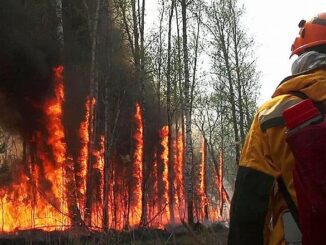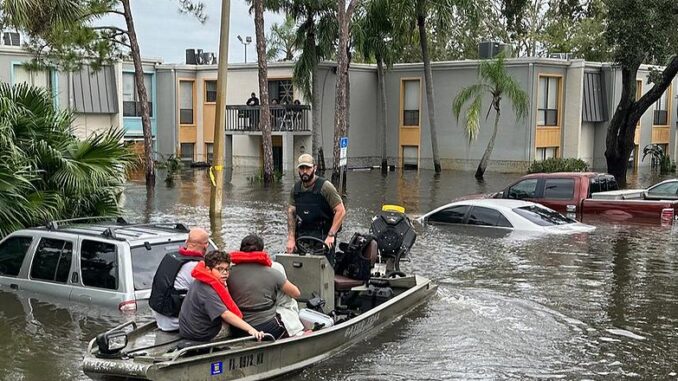
BAKU, Azerbaijan, November 15, 2024 (ENS) – The year 2024 will break records as the planet’s warmest after an extended streak of exceptionally high monthly global mean temperatures, warns the World Meteorological Organization, as world leaders and climate negotiators meet in Baku for this year’s United Nations climate conference, COP29, which opened Monday for two weeks of talks.
Climate impacts are inflicting growing human and economic costs on every country in the world. “Ambitious outcomes in Baku are vital, because unless all countries can cut emissions and build more resilience into global supply chains, no economy – including the G20 – will survive unchecked global heating, and no household will be spared its severe inflationary impacts,” warn the COP29 organizers.
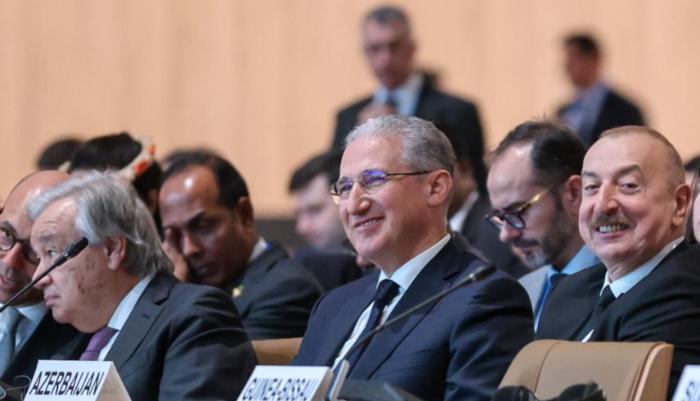
Climate finance tops the COP29 agenda, including the negotiation of a new global post-2025 climate finance goal -NCQG, the New Collective Quantified Goal on climate finance that would replace the current US$100 billion per year goal.
Delegates will also focus on operationalization of the new Loss and Damage Fund, including eligibility criteria.
The UN Framework Convention on Climate Change, UNFCCC, entered into force in March 1994. Each annual conference of the 198 countries that are Parties to the UNFCCC, is what organizers call “a vital global moment that must deliver major progress,” in preventing dangerous human interference with Earth’s climate system.
As part of the UNFCCC, the Paris Accord, approved unanimously by world governments in 2015, is the global agreement mapping the path for limiting global climate change to 2° Celsius higher than pre-industrial levels and to pursue efforts to limit the temperature increase to 1.5 degrees Celsius.
Simon Stiell of the Caribbean island nation of Grenada is currently executive secretary of the UNFCCC. As the lynchpin who holds the COP together, Stiell has high hopes for the Baku conference.
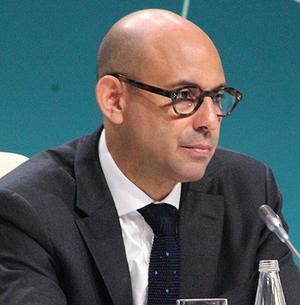
“COP29 must be an enabling COP, delivering concrete outcomes to translate the pledges made in last year’s historic UAE Consensus into real-world, real-economy results. Finance is key among the outcomes needed this year, and it is entirely in every nation’s interest to ensure COP29 delivers an ambitious new climate finance goal,” Stiell said.
“We can only prevent the climate crisis from decimating lives and livelihoods in every economy if every country has the means to take stronger climate actions, slashing emissions and building resilience in communities, infrastructure and supply chains,” Stiell advised. “COP29 must also elevate the work every government is doing on the all-important policy instruments due under the Paris Agreement.”
But Argentina’s 80+ negotiators, representing the government of far-right libertarian President Javier Milei, a climate science denier who dissolved the country’s environment ministry, have been directed to stop participating in the COP29 summit after just three days.
President Milei has called the climate crisis “a hoax” and “a socialist lie.” During his 2023 election campaign, he threatened to withdraw from the Paris agreement, although he reversed this position after taking office in December. Now he has ordered his negotiators to leave Baku.
“We are withdrawing from the conference on the instructions of the foreign service,” Ana Lamas , Argentina’s undersecretary of the environment, confirmed to the Spanish news outlet Climática.
For Spanish Prime Minister Pedro Sanchez, what happened in Valencia last month is a indelible reminder of what the stakes are these climate negotiations.
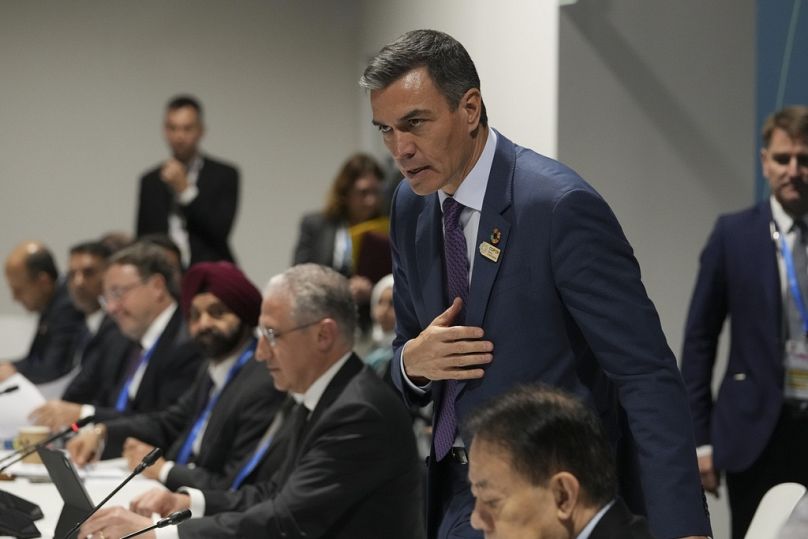
“I have come here to tell you that climate change kills and in Valencia, it has killed 220 of my compatriots,” he said to fellow world leaders in Baku on Tuesday.
Sanchez told of hundreds of mud-covered homes and mourned the many people still missing after the catastrophic weather event.
With all countries dealing with the impacts of climate change, from violent storms to intense wildfires, Sanchez said that “drastic measures” are needed, and cities must be rebuilt to withstand the worst of future climate crises.
“Some still doubt the scientific evidence of climate change,” Sanchez told COP29 delegates. “Let’s not drag our feet. We have seen governments dither and walk backwards just to make the rich richer. This formula is leading us to disaster.”
Climate TRACE: Gore at Core of AI Data Program
“Despite pledges and promises, global greenhouse gas emissions continue their steady rise, bringing with them the toxic air pollution that disproportionately impacts communities with fewer resources,” said former U.S. Vice President and Climate TRACE co-founder Al Gore.
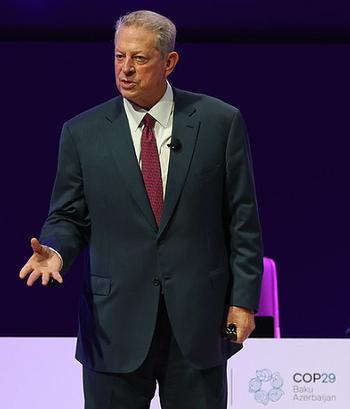
“But when climate leadership at the global and national levels has faltered, it is state and local leaders who have stepped in to fill the void. Now, with the help of breakthroughs in AI, Climate TRACE is filling an information void that has previously hindered local leaders from taking effective action to combat the global climate crisis and environmental injustice,” Gore explained.
Today, Climate TRACE released its latest inventory. For the first time, it provides monthly emissions data for every country and every major individual source of emissions in the world.
Climate TRACE has now compiled monthly emissions inventories for every state and province, every county, and more than 9,000 major urban areas around the world, providing subnational governments with critical information to accelerate climate action.
Before today, 80 percent of the world’s cities did not have access to a comprehensive inventory of their greenhouse gas emissions. With Climate TRACE, now they do. These urban areas account for 17 billion metric tonnes of carbon dioxide equivalent (CO2e), or more than 25 percent of all global emissions.
Climate TRACE now also tracks key non-greenhouse gas air pollutants for the world’s largest single point sources of emissions, including pollutants that are implicated in millions of deaths around the world every year.
World Governments Reveal Their Climate Plans
John Podesta, who heads the U.S. delegation to COP29, is Senior Advisor to the President for International Climate Policy. He told the conference this week at the start of the high-level segment that the world faces this urgent question: “Do we secure sustainable prosperity for our countries, or do we condemn our most vulnerable to unimaginable climate disasters?”
“The consequences of a rapidly warming planet are all around us,” Podesta warned, “from the hundreds of people killed by Hurricanes Helene and Milton in the United States, to the millions of children at risk of starvation in southern Africa from the worst drought in decades, to the torrential rain that stranded students in schools, and displaced nearly 100,000 in Colombia.”
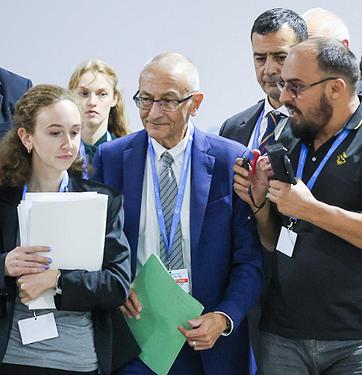
“Vulnerable communities do not just need ambition – they need action,” he declared.
“That’s why President [Joe] Biden and Vice President [Kamala] Harris have marshalled unprecedented climate resources over the past four years. Because of historic private sector investments made possible by the Inflation Reduction Act, the United States economy will continue down the path of decarbonization, reducing emissions for years to come,” Podesta said.
He said the United States is “on track to meet President Biden’s ambitious international public finance commitment of $11 billion per year by the end of 2024.”
However, former President Donald Trump has been re-elected for a second term that starts January 20, 2025. During his first tem (2017-2021), Trump pulled the United States out of the Paris Accord, and has indicated he wants to repeat the maneuver.
Trump says he will pull out of the Paris Climate Accords again if elected president. On October 20 in Pittsburgh, Pennsylvania, candidate Trump answered a question about the Paris agreement by NBC News by saying, “We’re going to do it again because it’s a rip-off of the United States.” Trump believes India and China “pay nothing” while the United States pays too much.
But the largest oil and gas company in the United States, ExxonMobil, is asking President-elect Trump not to withdraw the United States from the Paris agreement again.
Exxon CEO Darren Woods advised Trump to stay committed to the global climate accord at a COP29 event on Tuesday.
Woods told the Wall Street Journal in an interview that the business community finds it unhelpful “to have the pendulum swing back and forth as administrations change.”
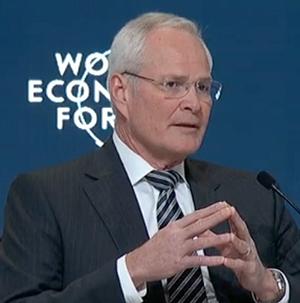
“I don’t think the stops and starts are the right thing for businesses,” Woods told the newspaper. “It is extremely inefficient. It creates a lot of uncertainty.”
“I don’t think the challenge or the need to address global emissions is going to go away,” Woods said. “Anything that happens in the short term would just make the longer term that much more challenging.”
President-elect Donald Trump won the election on a promise to boost United States’ fossil fuel production and eliminate President Joe Biden’s many policies aimed at reducing greenhouse gas pollution and speeding the growth of clean energy.
But Trump’s assumptions about the payments by the world’s top CO2 emitter, China, do not accord with the facts. An analysis of which countries pay how much to meet the goals of the Paris agreement by the nonprofit World Resources Institute concludes, “The climate finance flowing from China to other developing countries, via four distinct channels, amounted to just below $45 billion between 2013 and 2022. That equals 6.1% of the total climate finance developed countries provided during the same period.”
“On September 21, 2021, at the General Debate of the 76th Session of the United Nations General Assembly, President Xi Jinping stated that China will strive to peak carbon dioxide emissions before 2030 and achieve carbon neutrality before 2060. This requires tremendous hard work, and China will make every effort to meet these goals. “China will step up support for other developing countries in developing green and low-carbon energy, and will not build new coal-fired power projects abroad,” Xi’s government told the UNFCCC in a 2021 report.
All participating governments are due to submit their 2035 climate targets to the United Nations by February 2025. The most important will come from the three largest emitters today, which collectively account for more than 50 percent of global emissions: the United States, European Union, and China.
“The United States and EU have not reduced emissions quickly enough to align with the Paris goals, but they still delivered two-thirds of the 13 percent reduction in the Organization for Economic Cooperation and Development’s carbon emissions over the past decade. China, meanwhile, is responsible for more than 90 percent of the growth in carbon dioxide emissions since the Paris Agreement was negotiated in 2015,” Foreign Policy magazine said in an October article, even though President Xi Jinping has promised that China will become carbon neutral before 2060.”
“Global emissions need to peak urgently, and that is simply not realistic without China changing course,” Foreign Policy reports.
“To accelerate our progress here at COP29, we need to first conclude key negotiated outcomes,” U.S. delegation leader John Podesta told the COP29 delegates. “This includes … adopting a robust NCQG that addresses climate insecurity while building strong, sustainable economies.”
India is trying to build such an economy. India’s COP29 strategy emphasizes urging developed nations to fulfill their climate pledges.
India’s Prime Minister Narendra Modi will not attend the conference, and Environment Minister Bhupender Yadav may also be absent, with Union Minister of State for Environment, Forest, and Climate Change Kirti Vardhan Singh leading the 19-member delegation instead. Singh has a special interest in the protection of environment. He has actively engaged with the National Green Tribunal to curb ecologically harmful activities, and he is currently working on a project to rejuvenate local lakes in his district of Uttar Pradesh state in northern India.
India aims to bring renewed focus to the urgent need for climate finance, accountability, and protection for vulnerable communities.
NCQG: The New Acronym to Know
At COP29 delegates are focused on NCQG, the New Collective Quantified Goal on climate finance – a key element of the 2015 Paris Agreement aimed at setting a new financial target to support developing countries in their climate mitigation and adaptation efforts post-2025.
“It should be multi-layered with an ambitious, realistically achievable support layer involving new contributors, underpinned by a set of qualitative elements that evolve the international financial architecture, enhance access to finance for developing countries, and improve debt sustainability,” Podesta explained.
“Countries – particularly major economies – need to keep their Dubai commitment and submit 2035 NDCs that are economy-wide, 1.5 aligned, and include all greenhouse gases,” the U.S. delegation leader urged.
“Colleagues,” Podesta said, “we have a clear choice: between a safer, cleaner, fairer future, and a dirtier, more dangerous, and more expensive one. We know what to do. Let’s get to work. Let’s get it done.”
Solutions Do Exist
In a first panel on effective climate solutions, stakeholders from civil society, governments, and the UN emphasized how local communities can lead in building resilience. This takes place only with support for accessing finance and developing systems to anticipate and adapt to climate shocks such as storms, floods or earthquakes.
Loretta Hieber-Girardet with the United Nations Office for Disaster Risk Reduction, UNDRR, proposed that developing early warning systems can be an “entry point” for longer-term resilience building in fragile situations. She offered examples of such community-based action, including: early warning systems for drought in Somalia; use of WhatsApp and Telegram for flood alerts in Syria; microfinance solutions in Haiti; and community mediation programs for disputes over natural resources in Myanmar.
Non-Government Stakeholders Play Important Roles
Governments that are Parties to the convention send delegations to the annual conferences and so do non-Party stakeholders – businesses, investors, cities, states, regions, and nongovernmental organizations.
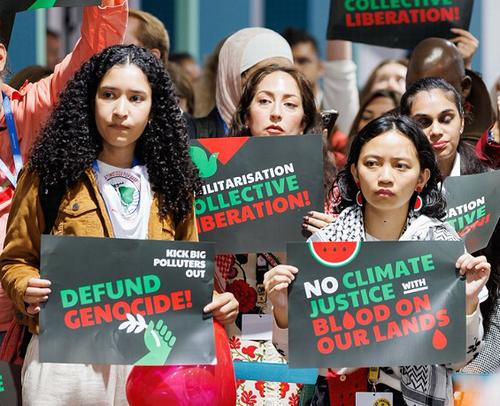
These non-Party stakeholders come together under the Marrakech Partnership for Global Climate Action launched in November 2016 at COP 22, the first meeting of the governing body of the Paris agreement.
The Marrakech Partnership’s mission is driving progress towards the goals of the Paris agreement; recent progress is highlighted in the 2024 Yearbook of Global Climate Action launched today.
The Yearbook showcases climate action, such as finance and nature protection, by non-Party stakeholders, and highlights their roles in raising ambition, as governments develop their next round of national climate plans due next year and to build resilience to growing climate impacts.
“There can be no comprehensive approach without the involvement of the entire economy and the whole of our societies. And that means we need Parties and non-Party stakeholders to work together, to join efforts, communicating on best ways forward, systematically,” urged Stiell.
The Yearbook reports that the Global Climate Action Portal now tracks over 39,000 actors, a big increase compared to the 1,000 actors the platform registered 10 years ago. The Portal also tracks 175 Cooperative Climate Initiatives, collaborative efforts by diverse stakeholders to achieve climate goals. Nearly 80 percent of these operate on a global scale.
“Discussions on carbon markets will play a fundamental role as we move forward. It will allow countries to better cooperate for a goal that is fundamentally common. After all, greenhouse gases somewhere are greenhouse gases everywhere. Working together to cut emissions is not individual work. It is shared,” Stiell observed.
The examples of climate action in the Yearbook show a growing emphasis on whole-of-society and inclusive climate action, demonstrating how multi-stakeholder action mobilizing the private sector, cities, youth, Indigenous Peoples, and following a gender-responsive approach is vital to address the climate crisis.
While challenges remain, particularly in mobilizing equitable finance and scaling decarbonization, the increased engagement of non-Party stakeholders provides a strong foundation for accelerating and scaling up collaborative climate action towards COP 29 and beyond.
In the foreword of the Yearbook, the High-Level Champions Razan Al Mubarak of the COP 28 Presidency (United Arab Emirates) and Nigar Arpadarai of the COP 29 Presidency (Azerbaijan) write, “At COP 28, we witnessed transformative stories of resilience and innovation. Climate action is advancing across the globe. Collectively, we have the potential to pivot towards a thriving future. COP 29 is a defining moment to build on this ambition, translating it into immediate, far-reaching impact.”
Race to Zero
Race to Zero, a global campaign rallying non-state entities to take immediate action to halve global emissions by 2030, has shown a growth of 16 percent in the last year, by COP 29 it will have over 15,500 members from more than 150 countries transitioning to net zero and contributing to halving global emissions.
This includes over 12,400 companies of which over 9,200 are small- and medium-sized enterprises. Membership includes 1,100 cities, nearly 50 states and regions, 650 financial institutions, 1,200 education institutions, and 80 healthcare institutions.
Two new larger partners have joined this campaign: the Net Zero Export Credit Agencies Alliance, representing US$120 billion in international trade, and the United Kingdom’s National Parks, which are pioneering nature-positive commitments, such as turning the 15 UK National Parks into net carbon sinks by the year 2050.
On November 15, its fifth day, COP29 hosted a high-level panel on climate and peace. Still, with conflict raging in many parts of the world, the need to reform the COP process has grabbed more of the delegates’ attention in Baku.
In an open letter published Friday, 20+ experts including former UN Secretary-General Ban Ki-moon, former President of Ireland Mary Robinson, and former UN Climate leader Christiana Figueres said that despite its achievements the COP process needs reform.
The letter calls for seven key reforms from stronger tracking of climate financing and integration of the latest scientific evidence to smaller, more frequent, meetings and strict eligibility criteria for host nations.
Featured image: When Hurricane Milton blasted through Florida in October 2024, the Florida Fish and Wildlife Conservation Commission mobilized swamp buggies, airboats, shallow draft vessels, four-wheel drive patrol trucks and other equipment to rescue stranded residents. October 10, 2024 (Photo courtesy Florida Fish and Wildlife Conservation Commission)
© 2024, Environment News Service. All rights reserved. Content may be quoted only with proper attribution and a direct link to the original article. Full reproduction is prohibited.

